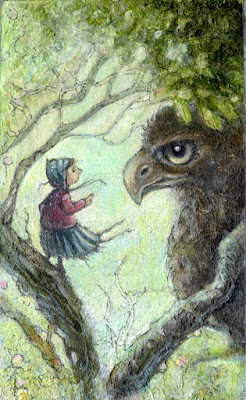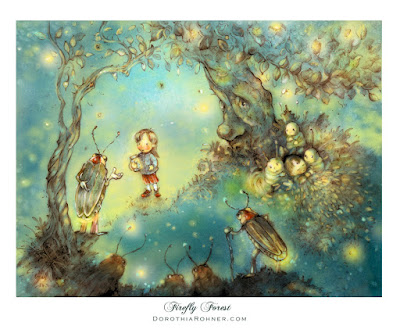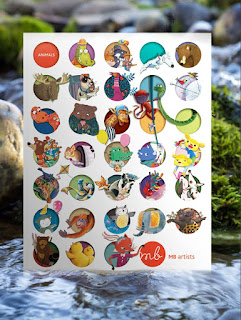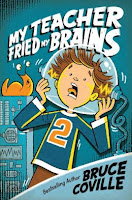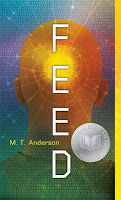Stephanie Fretwell-Hill of Red Fox Literary is looking for picture books, middle-grade, and young adult titles.
https://kathytemean.wordpress.com/2016/04/08/free-fall-friday-april-agent-interview/
Viewing: Blog Posts Tagged with: agents, Most Recent at Top [Help]
Results 26 - 50 of 877
Blog: Just the Facts, Ma'am (Login to Add to MyJacketFlap)
JacketFlap tags: news, agents, Add a tag
Blog: Just the Facts, Ma'am (Login to Add to MyJacketFlap)
JacketFlap tags: agents, Add a tag
How do you approach a prospective agent if you and your previous agents have gone your separate ways.
http://mariavicente.com/post/139046754464/how-to-approach-literary-agents-after-parting-ways
Blog: cynsations (Login to Add to MyJacketFlap)
JacketFlap tags: illustration, agents, Angela Cerrito, Laura Biagi, SCBWI Bologna 2016, Dorothia Rohner, Add a tag
By Angela Cerrito
for SCBWI Bologna 2016
and Cynthia Leitich Smith's Cynsations
From an early age, Dorothia Rohner knew she was an artist. Inheriting her artistic parent's fascination with art and nature, she was encouraged to pursue and refine her skills. She studied technical illustration, fine art, art history and graphic design.
Eventually, she earned her degree in Biological Pre-medical Illustration from Iowa State University—a curriculum that allowed her to combine her love of illustration and science.
As an artist, she has worked in various fields: scientific illustration, animation, graphic design, nature painting, licensing and gift design. She now works from her studio, surrounded by woods, overlooking a small pond where she writes and illustrates stories for children; inspired by nature, imagination and a tad bit of humor. She also enjoys creating pop-up and moveable books.
Her illustrated children’s books include: Numbers in a Row, An Iowa Number Book (Sleeping Bear Press) and Effie's Image (Prairieland Press).
Her work for children has also been published in Cricket Magazine.
Her illustration, Firefly Forest, was the Grand Prize Winner at 2014 SCBWI Bologna Illustrator Gallery, Bologna Children’s Book Fair.
That same year, she was selected for the 2014 SCBWI Portfolio Mentorship Award at the SCBWI Summer Conference.
Her portfolio was one of six chosen out of two-hundred. Follow Dorthia: Instagram & Twitter: @dorothiar and Facebook.
What inspired you to begin creating illustrations for children?
When I was small, my mother wrote stories for my six siblings and me. She created believable worlds and illustrations to go with them. They were never published, but I remember how magical an ordinary day became when she shared her stories with us—inviting us into her imaginative worlds.
My mother’s influence first inspired me to want to create books for children. Years later, while studying scientific illustration, the class assignment was to make a spread for a children’s book. That studio project sparked my childhood memories and rekindled that desire to make books for kids. It took a little while, but eventually I illustrated my first children’s book.
How has your experience with scientific illustration influenced your work for children?
Good question! The transition from creating scientific to children’s illustration has been interesting journey for me. Because of my scientific training, I wanted to add every detail into an illustration. For children’s illustrations, I’ve had to un-learn some of that training in order to leave emotional room for the viewer, exaggerated expressions, emotion and motion. I’m still working on that.
My training has influenced me to enjoy drawing animals, plants, birds and insects living in the natural world. However, with my illustrations for kids, I find it much more fun to add in a few fairies, and other whimsical critters.
What was the inspiration for the illustration Firefly Forest, winner of the 2014 SCBWI Bologna Illustrators’ Gallery?
I’ve always been fascinated with fireflies because of the magic they bring to summer nights. Years ago, like most children, we used to chase and capture them to fill our jars with light.
Inspired by these memories and the forest we now live near, I sketched out the trees that speak only truth, an angry council of fireflies that rule the forest and a little girl carrying a jar full of fireflies, searching for her brother. I intentionally left the narrative open for the viewer to interpret.
I created this illustration in two days and I really enjoyed working on it. However, I almost didn’t enter the BIG contest because I thought it was too odd of an illustration. However, I ended up sending it anyway. I’m glad I did.
What are you working on right now?
With the input of my agent, Laura Biagi, I am revising a manuscript that is almost ready for submission. Yay! I’m finishing up the character sketches and illustrations that will accompany this story.
While I was in New York at the winter SCBWI conference, I was able to meet with Laura to discuss my other projects. She asked about the story behind Firefly Forest, so I am brainstorming and diving into that next. I also received helpful input from an art director in New York on a novelty fairy book, so I will be revising that too. I also have a sketchbook filled with ideas that could be potential stories.
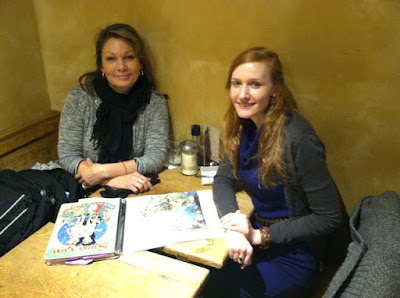 |
| Dorothia & Laura |
What advice would you offer illustrators who are just starting out in the field of children’s literature?
The advice I try to remember is patience, practice and perseverance. It’s hasn’t been that long since I began focusing on making books for children, so I still feel new to this, too.
In any field of creating art, I believe it is essential to honor your individuality and create from the inner voice. This helps to quiet the inner critic that so often leads to comparison and competition with other artists. It is important to study other artists work, get involved with online picture book communities, and celebrate other’s successes.
I would suggest joining SCBWI, going to conferences, getting portfolio and manuscript critiques, joining local critique groups and finding like minded people who you can learn from, share with and enjoy the journey. Lastly, read lots and lots of kids books!
Cynsational Notes
 Angela Cerrito is a pediatric physical therapist by day and a writer by night. She thinks she has the two best jobs in the world.
Angela Cerrito is a pediatric physical therapist by day and a writer by night. She thinks she has the two best jobs in the world.Her latest novel, The Safest Lie (Holiday House), was named a finalist for the 2015 Jewish Book Award, a Sydney Taylor Notable Book for Older Readers and a Notable Social Studies Book for Young People.
Angela Coordinates the SCBWI Bologna Interview series, volunteers as SCBWI’s Assistant International Advisor and is a Cynsational reporter in Europe and beyond.
Add a Comment
Blog: Just the Facts, Ma'am (Login to Add to MyJacketFlap)
JacketFlap tags: agents, Add a tag
If you ask a prospective agent these very basic questions, it shows you're not read to get an agent.
http://jetreidliterary.blogspot.com/2016/02/some-questions-you-shouldnt-ask.html
Blog: Just the Facts, Ma'am (Login to Add to MyJacketFlap)
JacketFlap tags: editors, agents, Add a tag
You want to be an author that agents and editors want to work with.
https://kathytemean.wordpress.com/2014/08/10/agent-talk-7-ways-to-make-yourself-an-easy-author-to-work-with/
Blog: JZ ArtBlog (Login to Add to MyJacketFlap)
JacketFlap tags: illustration, agents, shameless self-promotion, the life and times of the artist, Add a tag
The new MB Artists catalog is here! Check out all of the new "Animals" themed artwork from our artists!
Blog: Just the Facts, Ma'am (Login to Add to MyJacketFlap)
JacketFlap tags: news, agents, Add a tag
New agent Stephanie Fretwell-Hill represents everything from picture books to young adult.
Blog: Just the Facts, Ma'am (Login to Add to MyJacketFlap)
JacketFlap tags: agents, Add a tag
During the excitement of "the call," don't forget to ask questions of your prospective agent.
Blog: cynsations (Login to Add to MyJacketFlap)
JacketFlap tags: agents, Parker Peevyhouse, Ammi-Joan Paquette, Kathy Dawson, new_voice_2016, science fiction, Add a tag
 |
| Excerpt |
for Cynsations
Parker Peevyhouseis the first-time author of Where Futures End(Penguin/Kathy Dawson Books, 2016). From the promotional copy:
Five teens.
Five futures.
Two worlds.
One ending.
One year from now, Dylan develops a sixth sense that allows him to glimpse another world.
Ten years from now, Brixney must get more hits on her social media feed or risk being stuck in a debtors' colony.
Thirty years from now, Epony scrubs her entire online profile from the web and goes “High Concept.”
Sixty years from now, Reef struggles to survive in a city turned virtual gameboard.
And more than a hundred years from now, Quinn uncovers the alarming secret that links them all.
Five people, divided by time, will determine the fate of us all. These are stories of a world bent on destroying itself, and of the alternate world that might be its savior--unless it's too late.
Could you describe both your pre-and-post contract revision process? What did you learn along the way? How did you feel at each stage? What advice do you have for other writers on the subject of revision?
 |
| Parker Peevyhouse |
My agent, Ammi-Joan Paquette, also pointed out that the first story in the book had to be really gripping. Of course, every novel has to have an opening that grabs the reader, but that had to be especially true of Where Futures End, since the reader would only continue to the second story if s/he loved the first.
I worked really hard to revise the opening story before we sent out the manuscript on submission. But the feedback we got was that the first story still wasn’t working. The tone was too sad and dark, since the story dealt with a boy (Dylan) wrestling with the death of his brother; and Dylan was confusing, since he kept going back and forth on whether he had the ability to visit another world. I was pretty bummed about this feedback because I loved Dylan and his story, but I could see that the manuscript wouldn’t sell as-is.
I scrapped that first story and started over. I brought the dead brother back to life and made the plot focus on sibling rivalry. I created a more linear progression for Dylan’s investigation into whether he had the ability to visit another world, and I had the brother play a larger part in this mystery. To my surprise, this new version of the story felt even closer to what I had originally want to achieve. And it got a lot more interest from editors.
The editor who bought the novel, Kathy Dawson (who has her own imprint at Penguin), wanted me to make even deeper cuts. In the original version of the manuscript, Dylan is obsessed with a series of fantasy novels about the Lookingland, a magical realm Dylan thinks he can visit. Throughout the novel, other characters also try to access the Lookingland, so it became an element that tied together the separate stories that make up Where Futures End. Kathy suggested I cut out the Lookingland entirely; she thought it was too confusing, one more thing for the reader to keep track of in an already intricate novel. But how in the world would I then tie all of Where Futures End together?
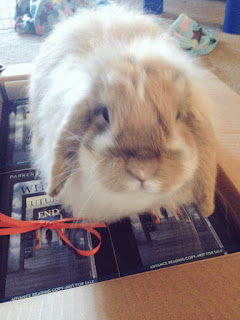 |
| Parker's assistant, Arya |
In the second part of Where Futures End, Dylan’s stories come to the public’s attention. In the third part, we see that books and movies have been made from Dylan’s stories. In the fourth part, a main character makes his living playing a video game based on Dylan’s stories. And in the fifth part, the stories take on a life of their own…
It was painful to make all of those deep cuts. I wasn’t always sure I should make such huge changes to my original vision! But I took the advice of my agent and did my revisions in a separate document so that I always had the option of reverting to the original manuscript.
That helped me make bold changes, and in the end, I felt the new versions of the manuscript were better than the old versions.
It helps to have an agent and an editor who are so insightful with their revision suggestions, but I also recommend taking chances with revisions, knowing you can always go back to what you originally wrote if those revisions don’t work for you.
As a science fiction writer, what first attracted you to that literary tradition? Have you been a long-time sci-fi reader?
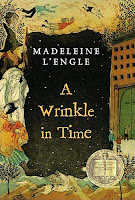 Does anyone else remember “poot” from My Teacher Fried My Brains by Bruce Coville (Aladdin, 1991)? I loved that crazy-weird stretchable pet when I was in grade school. And I was fascinated by the tesseracts in A Wrinkle In Time by Madeleine L’Engle (Farrar, Straus & Giroux, 1963).
Does anyone else remember “poot” from My Teacher Fried My Brains by Bruce Coville (Aladdin, 1991)? I loved that crazy-weird stretchable pet when I was in grade school. And I was fascinated by the tesseracts in A Wrinkle In Time by Madeleine L’Engle (Farrar, Straus & Giroux, 1963).When I was a kid, if there was a book in my library about something strange, I took it home.
Those books inspired me to write my own weird stories about kids visiting alternate realities and wielding supernatural powers.
Reading and writing science fiction was the only thing that could feed my ever-hungry imagination.
What drew me to science fiction as a kid were the strange ideas, the mind-benders, like Meg Murray talking about how time is the fourth dimension.
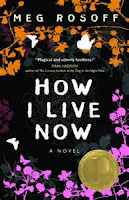 Where Futures End makes use of the tropes I’ve loved reading about from a young age: alternate universes, time distortion, psychic abilities. But I’ve also grown to love how science fiction explores personal interactions and cultural changes. I wanted Where Futures End to explore culture in the same way Feed by M. T. Anderson (Candlewick, 2002) does, and to explore relationships in the same way that How I Live Now by Meg Rosoff (Penguin, 2004) does.
Where Futures End makes use of the tropes I’ve loved reading about from a young age: alternate universes, time distortion, psychic abilities. But I’ve also grown to love how science fiction explores personal interactions and cultural changes. I wanted Where Futures End to explore culture in the same way Feed by M. T. Anderson (Candlewick, 2002) does, and to explore relationships in the same way that How I Live Now by Meg Rosoff (Penguin, 2004) does.Science fiction, more than any other genre, lends enough distance to gain new perspectives, and that’s the main reason I still love the genre.
Add a Comment
Blog: Just the Facts, Ma'am (Login to Add to MyJacketFlap)
JacketFlap tags: agents, news, Add a tag
Tanusri Prasanna is look for children's books from picture book through young adult.
http://www.writersdigest.com/editor-blogs/guide-to-literary-agents/new-literary-agent-alert-tanusri-prasanna-of-hannigan-salky-geltzer
Blog: Just the Facts, Ma'am (Login to Add to MyJacketFlap)
JacketFlap tags: agents, Add a tag
Congratulations, an agent wants to represent you. Now what?
http://bookendsliterary.com/index.php/2016/02/16/handling-an-offer-of-representation-the-extended-version/
Blog: Rachelle Gardner (Login to Add to MyJacketFlap)
JacketFlap tags: Publishing, Agents, Agent Process, About Agents, Add a tag
 Katie asked:
Katie asked:
I was wondering, what if I get an agent and she tries to sell two or three of my novels, all in the same genre, and nothing sells. What would happen in this case?
Well Katie, sounds like you and your agent will be at a crossroads and need to make some decisions.
Each agent is different, and some agents might set you free at this point, believing they’re not the right agent to help you find success. You’ll want to clarify whether your agent wishes to continue or hang it up.
Remember that you have a choice, too. You may want to consider indie publishing. If you want to continue pursuing traditional publishing, and you think another agent can serve you better, it would be a good time for you to make this decision. Be cautious not to automatically blame your agent for the lack of a sale – she’s put in many hours on your behalf and hasn’t gotten paid a thing. She probably deserves the benefit of a conversation, at least.
If you and your agent want to continue working together, you’ll probably have a meeting to discuss your options. You’ll take a hard look at what’s going on, asking questions like:
→ Why aren’t your books capturing the attention of editors? Is it the ideas? The writing?
→ Could there be something specific about your characters and plot lines aren’t resonating?
→How much of this is due to the market, and how much is it the specific books you’re pitching?
→ Is it the genre? If so, is there another genre you’re interested in writing that perhaps is more saleable?
Ideally this meeting would culminate in a strategy and action plan for moving forward to find the success you’ve been working toward.
Keep in mind that this isn’t an uncommon scenario. Once you get an agent, it could still be a long time until serendipity strikes again and you find the perfect match between a project and a publisher.
What would you do if you were the writer in this situation?
TWEETABLE
What’s a writer to do when their agent can’t seem to sell their work? Click to Tweet.
Image copyright: scottff72 / 123RF Stock Photo
The post When You’re Missing the Mark appeared first on Rachelle Gardner.
Add a CommentBlog: Just the Facts, Ma'am (Login to Add to MyJacketFlap)
JacketFlap tags: agents, Add a tag
An agent is your partner in your writing career, and can share many lessons with you.
http://www.adventuresinyapublishing.com/2015/12/working-collaboratively-can-you-check.html#.Vq0q_fkrJlZ
Blog: The Bookshelf Muse (Login to Add to MyJacketFlap)
JacketFlap tags: Uncategorized, Agents, Rejection, Guest Post, Revision and Editing, Publishing and Self Publishing, Positive & Negative Thesaurus Guides, Add a tag
We’re going to throw something different into the mix today: a post about screenwriting mistakes. This is an important post for all writers to read, including novelists, because the same advice can easily be translated to your fiction stories as you set out on the query trail.
For those who know us well and have read our books, especially The Positive Trait and Negative Trait Thesaurus books, you know we are huge supporters of writers learning from screenwriters and screenwriting structure techniques. One of our favorite instructors is Michael Hauge in fact, so much so that we’re bringing on a Story Structure tool that incorporates the 6-Stage structure model over at One Stop For Writers. (You can find out more about that incredible bit of news [and sneak-a-peek at what it looks like] HERE.)
All right, time to hand things over to our guest today, Norman Arvidsson. Please read on!
“The Play’s the Thing” – Unless You are Committing These 10 Errors
 90% of the scripts registered with the WGA are never completely read by script readers. They are rejected early on by readers who are overworked and pretty intolerant of basic errors that would-be screenwriters make. If you want to be in the 10% that get fully read and receive that call for further discussion, then don’t make these 10 fatal errors.
90% of the scripts registered with the WGA are never completely read by script readers. They are rejected early on by readers who are overworked and pretty intolerant of basic errors that would-be screenwriters make. If you want to be in the 10% that get fully read and receive that call for further discussion, then don’t make these 10 fatal errors.
- Poor Development of the Main Character(s)
There are several potential goofs in the area of character development.
- First, don’t write physical descriptions of your main character(s). You may have a picture in your mind of a character, but first readers don’t want that picture. They want to develop their own physical picture as they read the script. It can be irritating to a reader to have a physical description forced on them in the beginning.
- Second, the character must face at least one issue that is big enough, even in comedies. If s/he does not, then there is no way the script can ever be translated into a full length play or movie.
- Third, the character has to stay in character. Yes, events may change his/her mind about something, but the basic personality has to stay.
The way to avoid problems with consistency of character is to have your entire plot at least outlined before you begin to write page one. If you develop your plot as you go along, then you are trying to make your characters “fit” into a plot you are continually developing. It never works.
- Poor Structure
If you are writing a script, it is assumed that you understand the components. You have to include each of those components in sequential order, and the readers has to be able to locate them as the script is reviewed. Of course, you know that you have to have an initial incident or conflict, followed by that initial turning point, the mid-point, a second turning point and then the climax and resolution. If you cannot identify these elements in your own script, something is wrong. The best way to avoid this is to have a storyboard before you begin to write. You are then able to label each plot section, know that your sequencing is correct, and see that each component is actually there.
- Too Long/Too Short
One of the first things a script reader will look at is the length. These people know what you should know too. A script has to be between 90 – 140 pages. If it is too short, you have either left out important plot elements or truncated some of the scenes. If it’s too long, you have irrelevant content and scenes are too long. When scripts are not a reasonable length, the issue is usually poor structure. Return to your storyboard, take each section, read through that section of script and determine its “tightness.” If your script is too long, are you be-laboring dialogue by repeating a characters thoughts? If it is too short, do you need to develop an element further through more dialogue? The other possible problem, of course, is that the issue/conflict is not complex enough for a full-length script. Then you are back at square one.
- Giving the Reader too Much Character and Scene Description
Script readers are very good with “filling in the blanks.” And they want to read something that lets them get their own mental pictures. So dump the long descriptions of the settings and characters. Descriptions should be minimal – just a couple of phrases. If you want excellent examples of this, pick up a copy of a Shakespearian play and read the descriptions at the beginning of the scenes.
- Bad Writing (avoid writing mistakes)
Script readers are pretty much well-schooled in grammar, word usage, spelling and punctuation. They are happy to forgive a few typos, and of course there are grammatical and agreement errors in the dialogue of characters who are supposed to have them. But beyond that you really need to avoid writing mistakes. Script readers are easily irritated by these types of errors, and that irritation will carry over to their overall feeling about your work. If you struggle with grammar and composition, find someone who is more expert to edit your script.
- Unoriginal Plot and/or Characters (Derivatives)
Of course you have your favorite authors and playwrights. We all do. But your love for a particular character or story line cannot carryover to your writing. Find inspiration for characters elsewhere – life is full of them. Use combinations of people you know or have known, unless, of course, your work is based upon some prominent real person. Script readers are looking for originality and they can pick up derivatives pretty quickly (so can an audience).
- Tired Dialogue
What no one wants to read or hear is dialogue that is filled with tired and overworked phrases or clichés. It’s not fresh and original, and you work will be in the 90% rejection pile. As you write, flag those parts of dialogue that seem “tired” or worn and move on so you don’t disrupt your flow. You have time to think about fresh ways to say something later on. Go back to those flagged pieces when you are finished, get some ideas from other creatives you know, and freshen up those spots.
- Characters Who “Tell”
The whole point of a screen play is to tell a story through the actions and dialogue of the characters. When a character says, “I am really angry with you” to another character, you are boring an audience. When characters say, “I love you” too much to each other, you are boring an audience. These things need to be shown not told. If you have a character who is angry, in love, in crisis, etc., go back and study movies or plays in which characters had these emotions and issues. Get some ideas about how to show them through dialogue and nonverbal behaviors.
- Not Resolving Every Conflict/Issue
This is known as “fudging” and it does not work. If you have not resolved everything by the end of your script, do not submit it. You cannot just gloss over stuff and hope it is not detected. It will be detected, your story will not be complete, and your submission will be rejected. You have to wrap everything up and “tie a bow” on it. Go back to your storyboard. Find every conflict and issue. Then mark on that storyboard where it has been resolved. Resolution of all means you have a “tight” plot, and this is what script readers must see.
- Format Issues
Don’t have your script rejected because you failed to follow proper format. If you don’t understand format for submissions, then get thee to a website that explains it or check with someone who is “in the know.” This is the easiest error of all to correct.
There are lots of reasons why scripts are rejected. Don’t count on a script reader to provide the details for why yours has been. S/he doesn’t know you personally and does not have the time to give feedback unless there is interest. Screenwriting is a creative art to be sure, but there is also a “science” involved. These 10 errors are part of that “science,” and they are critical.
 Norman Arvidsson is a freelance web developer with more than two years of experience behind him and also a contributing blogger.
Norman Arvidsson is a freelance web developer with more than two years of experience behind him and also a contributing blogger.
He is interested in web-design, web development, motivation, online education and personal growth. You can contact him through his Twitter, Facebook, Google+ or LinkedIn.
Have any questions about these 10 error to avoid? What would you add to the list? Let us know in the comments!
The post Why Scripts Are Rejected: 10 Screenwriting Errors To Avoid appeared first on WRITERS HELPING WRITERS™.
Blog: The Official SCBWI 10th Annual New York Conference Blog (Login to Add to MyJacketFlap)
JacketFlap tags: agents, Ginger Clark, acquisitions committee, #NY16SCBWI, Add a tag
 Ginger Clark has been a literary agent with Curtis Brown since 2005. She represents many genres and categories of books in addition to representing the British rights for Curtis Brown's children's list. She's lots of fun on Twitter, and from there you may have learned she's really into wombats and Peter Capaldi, but aren't we all?
Ginger Clark has been a literary agent with Curtis Brown since 2005. She represents many genres and categories of books in addition to representing the British rights for Curtis Brown's children's list. She's lots of fun on Twitter, and from there you may have learned she's really into wombats and Peter Capaldi, but aren't we all?
Sarah Davies and Ginger Clark tag team on describing how a rolling auction works. All of the bidding publishers give their bid, and then the lowest bidder is asked if they can match the highest bid, and the other bidders are approached in turn, and this can go around a few times, perhaps up to seven rounds.
Compared to a best bids auction, where Ginger asks for editors to name their ultimate bid and no additional rounds of bid-taking happen.
For most books Ginger has sold she's initially sent out the submission to 12 editors. In special cases she's sent the submission out to upwards of 27 editors (and she notes that 25% of those 27 were at Penguin Random House, which is the strange reality of big houses merging into even bigger houses these days).
The most important 'gets' in a contract to Ginger are:
Translation rights, British rights, audio rights, joint vs. separate accounting on multiple book deal royalties (you want separate accounting!!) Ginger will only take joint accounting deals unless there are no other offers OR the publisher is offering them an insane amount of money. Other than that, deal-killers are up to the client, says Ginger.
Ginger's last bit of advice:
When picking an agent, pick someone you think will be a great advocate for you and will be a great, professional advice-giver—don't pick someone only because you think they could be your best friend, or that reminds you of your mom or Peter Capaldi, or because they own a wombat.
 |
| (l-r) Peter Capaldi as Malcolm Tucker; wombat from How To Negotiate Everything |
Blog: Just the Facts, Ma'am (Login to Add to MyJacketFlap)
JacketFlap tags: agents, Add a tag
Things to think about when you're search for your perfect agent."
http://mcintoshandotis.com/2014/12/how-many-agents-can-fit-in-a-room-finding-your-perfect-agent/
Blog: cynsations (Login to Add to MyJacketFlap)
JacketFlap tags: agents, Add a tag
From Cynthia Leitich Smith's Cynsations
Former editor and foreign rights manager Stephanie Fretwell-Hill has joined boutique agency Red Fox Literary.
"Stephanie approaches the children's book business with the same thoughtfulness and concern for authors and illustrators that we at Red Fox Literary strive to be known for," says agency co-founder Karen Grencik.
Fretwell-Hill began her publishing career in 2004 at Walker Books Ltd. in London, where she sold foreign language rights for projects by legendary artists such as Helen Oxenbury and Lucy Cousins. Though she worked across a broad range of territories including Eastern Europe, and Spanish speaking countries across the world, she specialized in developing new markets, selling the first Walker Group titles into Russian and Arabic territories.
In 2011, Fretwell-Hill joined Atlanta-based Peachtree Publishers, where she edited board books through young adult titles. Her acquisitions received such honors as YALSA Best Fiction for Young Adults, Bank Street Best Children's Books of the Year, Parents' Choice Awards, and numerous starred reviews.
"She has a careful and well-considered approach to editing, plus an excellent eye for illustration," says co-founder Abigail Samoun.
For Fretwell-Hill, becoming an agent is the culmination of ten years' experience in children's book publishing. Her new role combines the buzz of sales and negotiation with the creativity of editing and acquisitions, but mostly hinges on building strong relationships. "I'm really looking forward to working closely with authors and illustrators," she says. "Kind, passionate, and creative people are my favorite part of this business."
Red Fox Literary, founded by Grencik and Samoun in 2011, was recently named one of the top ten children's book agencies ranked by Publishers Marketplace sales.
The agency represents over eighty authors and illustrators, including Dan Krall, Julie Falatko, Lee Wind, Sarah Watts, Masha D'yans, Hannah Harrison, Miranda Paul, and other stand-out talent.
In 2014, Red Fox brought on board award-winning blogger Danielle Smith, who recently signed National Book Award finalist Beth Kephart.
2015 saw the agency's clients receive nearly a dozen starred reviews on titles such as Snappsy the Alligator (Did Not Ask to Be In This Book) (Viking), One Plastic Bag: Isatou Ceesay and the Recycling Women of the Gambia (Millbrook/Lerner), and Mary Cassatt: Extraordinary Impressionist Painter (Christy Ottaviano/Holt).
"We're delighted to have Stephanie become the fourth agent at Red Fox," says Samoun.
Stephanie Fretwell-Hill will be open to submissions for six months. Interested authors and illustrators can send art samples, complete picture book text, or the first three chapters of a novel to [email protected].
Add a Comment
Blog: Just the Facts, Ma'am (Login to Add to MyJacketFlap)
JacketFlap tags: conferences, agents, Add a tag
Here are some tips for pitching an agent at a writing conference.
http://thewritelife.com/tips-for-pitching-a-literary-agent-at-a-writers-conference/
Blog: Just the Facts, Ma'am (Login to Add to MyJacketFlap)
JacketFlap tags: picture_books, agents, Add a tag
Not all children's book agents represent picture books, but here are more than fifty who do.
http://christiewrightwild.blogspot.com/p/agents.html
Blog: Inkygirl: Daily Diversions For Writers (Login to Add to MyJacketFlap)
JacketFlap tags: editors, agents, survey, art directors, Surveys and polls, Add a tag
To agents, editors and art directors out there: please take a few minutes to answer a short anonymous poll to help up-and-coming writers and illustrators?
Results will be discussed at the SCBWI-Florida Regional Conference, SCBWI Metro NY Chapter (Feb event) and SCBWI-LA Writer's Day as well as summarized in Inkygirl.com later this year.
For editors and art directors, I'm looking for those who are involved in the decision-making process re: book contracts or initial talent-scouting. Thank you SO MUCH!
You can find results to previous surveys in my Inkygirl Survey Archives.
Blog: Just the Facts, Ma'am (Login to Add to MyJacketFlap)
JacketFlap tags: editors, agents, getting_published, Add a tag
Make sure you follow these important steps before hitting "send."
http://scotteagan.blogspot.com/2015/11/important-steps-before-submitting-to.html
Blog: Just the Facts, Ma'am (Login to Add to MyJacketFlap)
JacketFlap tags: agents, Add a tag
Sometimes the best of matches doesn't work out, and it becomes time to divorce your agent.
http://www.huffingtonpost.com/karen-dionne/inside-traditional-publis_5_b_8240370.html
Blog: JZ ArtBlog (Login to Add to MyJacketFlap)
JacketFlap tags: illustration, agents, shameless self-promotion, art reps, the life and times of the artist, Add a tag
MB Artists has released our newest catalog, themed "Adventure". Check out all of fun new artwork!
Blog: Just the Facts, Ma'am (Login to Add to MyJacketFlap)
JacketFlap tags: editors, agents, getting_published, Add a tag
What is appropriate to do when you've waited and waited and haven't heard back from an editor or agent?
https://elizabeth-law.squarespace.com/blog/2014/9/30/the-art-of-following-up-5-things-to-do-when-you-havent-heard-back-from-an-editor-or-agent
Blog: Just the Facts, Ma'am (Login to Add to MyJacketFlap)
JacketFlap tags: agents, Add a tag
What does it mean when an agent asks for an exclusive and how does it work.
http://writersinthestormblog.com/2015/09/exclusive-requests-from-literary-agents-what-are-they-and-how-do-they-work/
View Next 25 Posts





